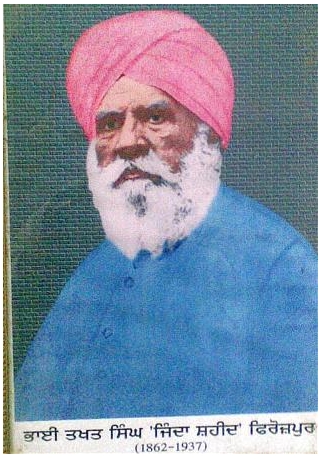TAKHT SINGH, BHAI (1870-1937), a pioneer of women\’s education, was born at Firozpur around 1870. His father, Deva Singh Nihang, is said to have fought in both of the Anglo Sikh wars (1845-46 and 1848-49). Takht Singh passed the High Proficiency (Vidvan) examination in 1887 from the Oriental College at Lahore, where two of his teachers, Bhai Gurmukh Singh and Giani Ditt Singh, both leading figures in the Singh Sabha reform movement, deeply influenced him. Takht Singh returned from Lahore resolved to dedicate himself to the cause of women`s education among Sikhs. To a modest open air school he had established at Firozpur, he added in 1904 a boarding house which marked the beginning of the Sikh Kanya Mahavidayala.
The institution, the first of its kind, gave a fillip to education among Sikh women and became a centre of cultural and literary activity. In running this school, Bhai Takht Singh received great support from his wife, Bibi Harnam Kaur. Upon her decease in 1906 he married, on 17 September 1910, Bibi Agya Kaur, who also proved a worthy helpmate. Bhai Takht Singh travelled to distant places, such as Rangoon, Malaya and Singapore to raise funds for the Mahavidayala. In 1907 was begun the erection of the main building of the school. The same year was launched a literary and social magazine, the Panjabi Bhain (Punjabi Sister).
At the Sikh Kanya Mahavidayala, Bhai Takht Singh started assembling books, manuscripts, journals and newspapers, mainly in Punjabi. This was the beginning of what in course of time grew into a prestigious collection, named Bhai Ditt Singh Library in honour of his teacher of Oriental College days. The collection came to the Punjabi University at Patiala in 1983. Bhai Takht Singh remained actively associated with the Sikh Educational Conference and was, as a rule, called upon to say ardas, supplication prayer, at its annual sessions. Such was the quality of his dedication to his work that his colleagues affectionately called him Zinda Shahid, the Living Martyr. Bhai Takht Singh died on 18 December 1937.
References :
1. Ganda Singh, ed., Bhagat Lakshman Singb: Autobiography. Calcutta, 1965
2. Lal Singh, Giani, Guru Bahsavah. Singapore 1939
3. Karam Singh, Jivan Bibi Harnam Kaur. Firozpur, 1907
Bhai Takht Singh (1870–1937) is revered as a trailblazer in the realm of Sikh women’s education—a visionary who challenged entrenched norms and opened new avenues for empowerment within the community. Born in Firozpur, his academic journey and intellectual exposure at institutions like the Oriental College in Lahore instilled in him a fervent commitment to social reform, particularly concerning the education of women.
Upon returning to Firozpur, Bhai Takht Singh embarked on a transformative mission. In an era when educating girls was widely questioned—even condemned—he courageously established a dedicated school for Sikh girls, thereby laying the groundwork for systematic women’s education. His pioneering initiative was not limited to mere instruction; he also actively engaged in dispelling misconceptions and societal prejudices. Through community dialogue and by invoking the timeless Sikh principle that knowledge is liberating, he gradually won over even the most skeptical quarters.
Not content with institutional reforms alone, Bhai Takht Singh further ignited the cultural renaissance among Sikh women by launching the magazine Panjabi Bhain (Punjabi Sister) in 1907. This publication became a vibrant platform for sharing literary works, promoting progressive ideas, and nurturing a public space where women could voice their thoughts and aspirations. His efforts extended to collecting and preserving valuable manuscripts, a legacy that contributed to the establishment of a comprehensive library for Sikh literature—ensuring that the wisdom of the past continued to guide future generations.
Bhai Takht Singh’s legacy is emblematic of the transformative power of education as a tool for social change. His work paved the way for subsequent reform movements, inspiring not only a generation of Sikh women to pursue knowledge but also challenging wider societal structures in pursuit of equality and progress.



